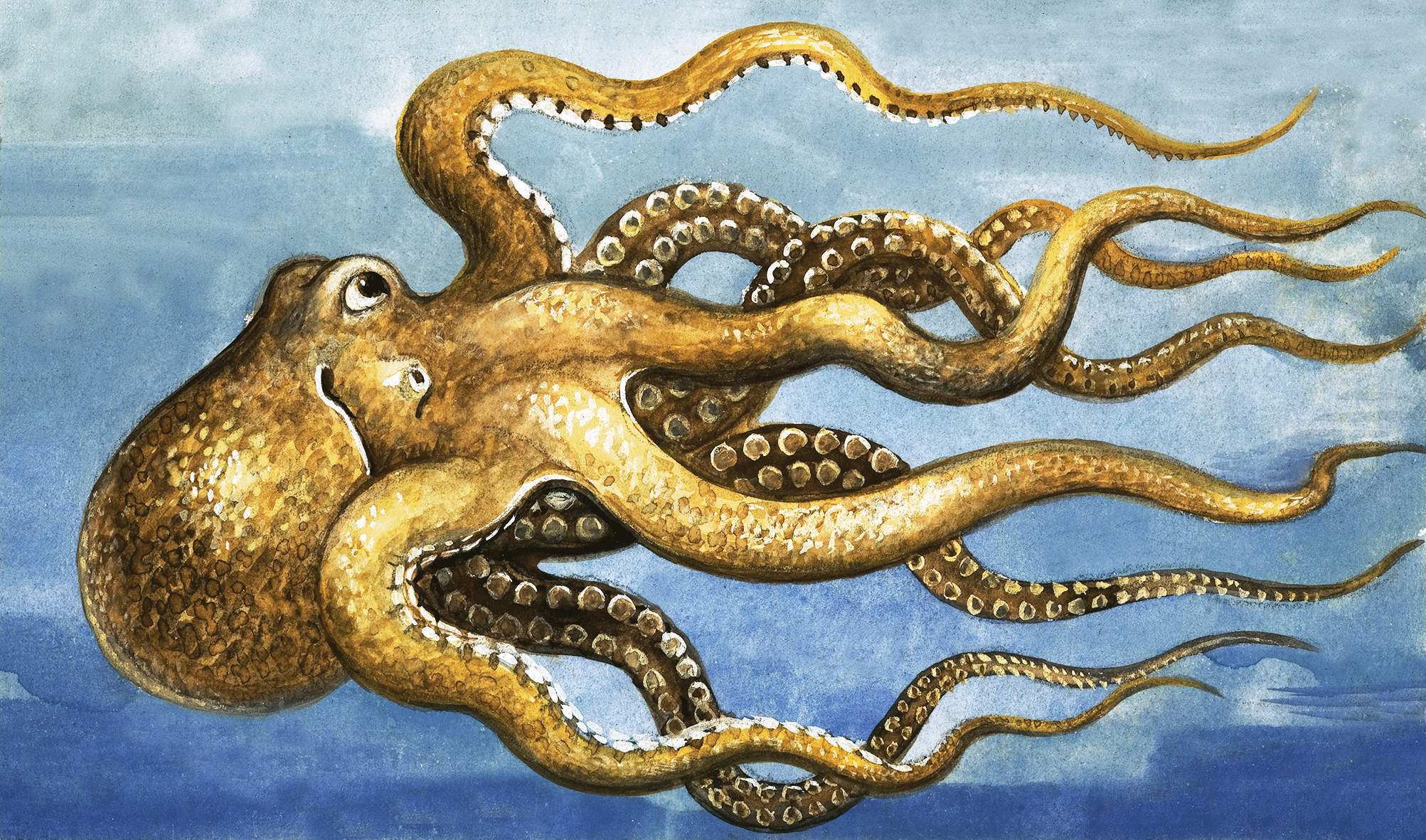
The Soul of an Octopus: a Surprising Exploration into the Wonder of Consciousness
Sy Montgomery
Simon & Schuster, 263pp, £12.99
The octopus is a dread creature, so alien that it seems to exist only in our nightmares. In the sea on which his ancient mariner sailed, where “the very deep did rot”, Coleridge evoked these eldritch beasts: “Yea, slimy things did crawl with legs/Upon the slimy sea.” For Victor Hugo, the octopus was a deathly demon, almost sexual in its devouring mien. The “devil-fish, horrible, sucks your lifeblood away”, he wrote, imagining it consuming its victim “with innumerable hideous mouths”.
The possession of more than the usual four limbs appears to have consigned the octopus to this fate. Pliny claimed, “No animal is more savage in causing the death of man in the water.” Nor is there any more terrifying vision than the vast and loathsome Kraken, rising up to drag good men and ships down to the abyss.
It’s not surprising that it has taken us a long time to reappraise the octopus, imbued with such mythical awe, as what it really is: an intelligent animal with entwining arms so filled with neurons that each of them possesses a separate personality. In the current nature writing boom– fuelled in part by new scientific discoveries – the revision of the octopus is just one in a series of natural histories, of creatures from corvids to cetaceans, which indicate that our awareness of other species is expanding exponentially. As an interviewee in Sy Montgomery’s remarkable book declares, “It’s really only in the last 20 years we could even be having this conversation. We’re only starting to understand animals.”
Doing for cephalopods what Helen Macdonald has done for raptors, Montgomery, a naturalist and author based in the US state of New Hampshire, sets off for the New England Aquarium in Boston to commune with captive octopuses. She is quickly entranced. As she plunges her arms into their tanks, the animals use their tentacles to taste her skin. Yes, they are slimy – Montgomery describes them memorably as “a sort of cross between drool and snot” – but their slime is a protective layer and a lubricant. An octopus’s ability to secrete itself in the smallest crevices (whether a cave or, in the case of an escapee from an aquarium, a water pipe) is limited only by its sole hard structure: its eerie, parrot-like beak. Captive octopuses pose a notable problem for aquarium keepers: they are just so smart. At one establishment, staff couldn’t work out why prized fish were disappearing from a tank. CCTV
footage showed that during the night, an octopus in a tank at the other end of the room was lifting its lid, crawling over to the fish tank, claiming its prize, then sneaking back home as if nothing had happened.
Yet the octopus’s most amazing talent may be another kind of subterfuge – its ability to camouflage itself. It can replicate complicated patterns (even a chessboard) by means of millions of chromatophores in its skin, triggered by sensory organs in its tentacles that determine the surface and even the texture of the terrain it seeks to mimic. A single octopus on a Pacific coral reef was seen to change 177 times in a single hour. This skill is not instinctive but learned.
How did such an apparently simple creature come to be so clever? Jennifer Mather, an “octopus psychologist”, proposes that the evolutionary process may have begun when the octopus’s ancestor lost its protective shell. The newly mobile animal became an active hunter and also more vulnerable – hence the need for disguise. Other studies suggest that in their ability to change colour, shoot clouds of defensive ink and construct shelters (a recent YouTube clip showing one using a coconut shell for that purpose went viral), octopuses exhibit something close to a “theory of mind”, the ability to anticipate the thoughts of other animals.
Montgomery becomes attached to her subjects – literally, courtesy of those manifold suckers. Sadly, octopuses are short-lived – many survive for only three years – so her relationships with Octavia, Athena and Kali at the aquarium are both ecstatic and fraught with accelerated life. She is unabashed in her emotional response to animals that flush red with excitement during their encounters with human beings. At one point, she describes Kali’s pupils as being dilated as “those of a person who’s newly in love”.
From Boston, we follow the author out of the aquarium and into the open sea as she learns to scuba-dive in order to get even closer to her beloved beasts. Her tone is homey (the adjective “awesome” is used liberally) and her interpretations are unashamedly anthropomorphic. Although her lively account is made rigorous by the injection of scientific commentary from various experts, emotion is never far away.
The “civilian” characters in the book have their own stories: we encounter Anna, a teenage girl with Asperger’s syndrome, and Wilson, another aquarium volunteer whose wife is dying. Both find solace in the company of octopuses. Yet these human tales pale beside those of the animal. As a creature described as possessing “intelligence without a centralised self” and whose skin expresses its mood, the octopus has an existence of a complexity that defies the apprehension we project on to it.
Most people these days see octopuses only as an item on the menu. Montgomery’s charming, eye-opening book may not change your life, but it may make you think twice about eating them.
Philip Hoare’s books include “The Sea Inside” (Fourth Estate)






